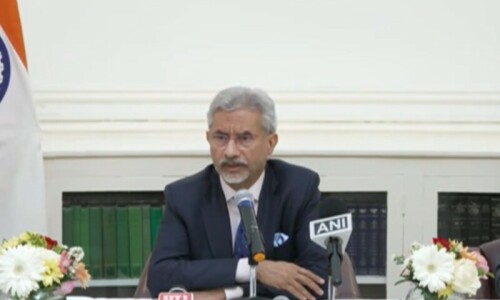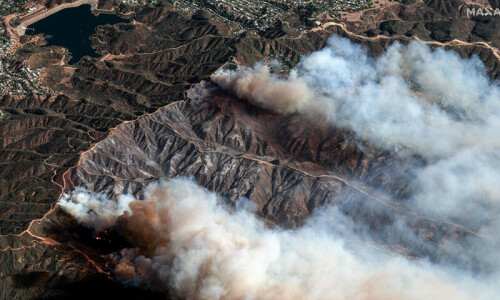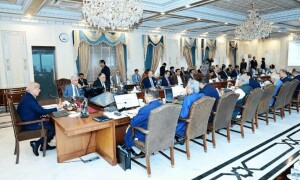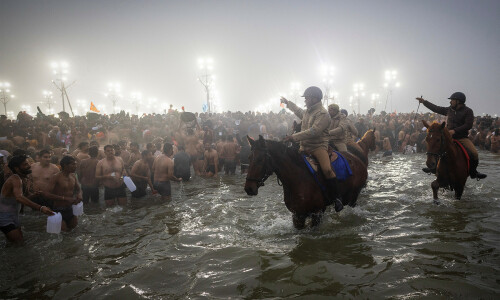
In the aftermath of the Quetta massacre, the arrests of a few Lashkar-e-Jhangvi (LeJ) militants have been looked upon warily as nothing more than a ploy to placate an angry nation.
If there was sincerity and strategic considerations behind this move, however, the headquarters of the Sunni extremist group in Punjab would have been dismantled much earlier.
But with elections approaching, a full-fledged and whole-hearted operation against such militant groups seems highly unlikely, especially in the Punjab, the breeding ground of sectarian militants. This has much to do with the fact that in Punjab, extremist and militant groups have a strong electoral presence.
"I doubt that there will be a real crackdown," says author and journalist, Zahid Hussain, talking to Dawn.com: "The Punjab government has been looking the other way for too long and pursues the policy of appeasement." He added that it had even made a covert deal for the release of LeJ leader Malik Ishaq.
Seconding Hussain, defence analyst Hasan Askari Rizvi added: "The Punjab Government is known for patronising the LeJ and (its predecessor) Sipah-e-Sahaba Pakistan (SSP)."
But it’s not only the Punjab government complicit in the inaction against extremist sectarian outfits. The centre hasn’t appeared earnest about the issue either.
Hussain has serious reservations about Pakistan's National Counter Terrorism Authority, for example. The authority was created in 2009 under an executive order. "It remains dormant and a toothless body because the bill has yet to be passed in the National Assembly. There is also the unresolved matter of whether it should fall under the umbrella of the interior ministry when in the original charter, it was to be under the prime minister,” he explains.

And so the scourge of extremism will continue, as was seen last week when terror revisited the Shia Hazaras on Kirani Road in the south-western Pakistani city Quetta. The attack was also a grim reminder that without a national consensus in Pakistan on how to deal with domestic terrorism, the next attack is not far behind.
The bomb that killed over 90 people and injured more than 160, many of them critically, was the second major attack on Pakistan's minority Shia Hazaras this year. A twin-suicide attack at a snooker club on January 10 had killed 92 and wounded 121. With the Hazara community living huddled together in certain localities, they have become an even easier prey and large numbers can be annihilated in minutes.
Hazara Democratic Party (HDP) Chairperson Abdul Khaliq Hazara told Dawn.com that the terror and fear had reached such a crescendo that the Hazaras had stopped venturing out of their locales. "There is no place left in Quetta that remains safe for Hazaras, be it an educational institution, school, bus stops, government offices or a marketplace. Public space is increasingly shrinking for us," he said.
Where the LeJ derives power from
The LeJ, which claimed responsibility for these attacks, is born out of SSP. It also has ties with the Tehrik-i-Taliban Pakistan (TTP). In fact, some of the top TTP leaders, like the current spokesperson, Ehsanullah Ehsan, were all members of LeJ in Punjab, before they became part of the TTP.
"These groups morph and gel and even support each other," says Rizvi, who fears that "unless the government adopts a tough position and keeps up the pressure over an extended period of time" these attacks will continue.
Equally, if the government decides to pull the rug from under them, and has some successes to show to the people, it will gain legitimacy. "Nothing succeeds like success, and we saw that in Swat once the government decided to go all out; their efforts were lauded not criticized," he points out.
The HDP chairperson agreed that "The state is more powerful than the militants. We believe the state knows who the culprits are and if it wants it can round up the militants, cleanse the city off them, even kill them, in just three days.” But, he adds, “They don't want to.”
According to Rizvi, "Organisations like the LeJ, the SSP and the Ahle Sunnat Wal Jammat (ASWJ) are politically convenient, especially for all the Punjab-based political parties and even the present Punjab government – and they will not go beyond a certain point to enrage them."
"So while they will condemn acts of sectarian attacks and militancy, they will never muster the courage to condemn a particular group," he explains.
In addition, says Rizvi, these groups have embedded themselves in society by setting up schools, hospitals, mosques and other welfare organisations and created a strong support base, including those in the lower ranks of the police and the intelligence agencies."
"There is no place left in Quetta that remains safe for Hazaras, be it an educational institution, school, bus stops, government offices or a marketplace. Public space is increasingly shrinking for us."It is very easy for the LeJ, a predominantly Punjabi group to thrive in Balochistan, he further explains. "With a non-existent provincial government and the support of the Taliban, the place became a safe haven."
The LeJ made inroads in Balochistan and had steadily spread its wings (since 2004-05), where the ethnic Hazara community has been their main target. Talking to Dawn.com, senior journalist Rahimullah Yusufzai said: "Call it infiltration, or what you will, but the LeJ has succeeded in recruiting many Baloch, once considered quite secular."
According to Hussain, the Baloch have “been indoctrinated into hating the Hazara community.”
Khaliq points out that the whereabouts of the militant camps was common knowledge. According to reliable sources, the training camps are run in Mastung and Khuzdar, from where earlier attacks on Shia pilgrims going to Iran have taken place. Those who are apprehended, meanwhile, are released for want of enough evidence – and if the evidence is there, it's not produced in the courts.
The desire to eliminate Shias altogether is also constantly fed from the outside. "A proxy war between Iran and Saudi Arabia is being waged in Balochistan." says Khaliq. It is widely held that these anti-Shia militants receive funding from the Sunni-Wahabi sheikhdoms of the Arab world. The Shias, on the other hand are perceived to be supporting Iran.
Hussain, meanwhile, expresses surprise over the mushrooming of madressas in Balochistan, which lacks "even the most basic facilities for locals". The senior journalist adds that it’s common knowledge such ‘nurseries’ of extremism were being financed by Sunni-Wahabi leaning Middle Eastern countries.
So where do the agencies come in?
Some experts are also of the view that these assaults are carried out to deflect international attention from the ongoing separatist movement in Balochistan.
The HDP spokesperson insists that such acts of terrorism are carried out in collusion with the security and intelligence agencies.
Yusufzai, however, does not believe in this commonly held viewpoint. "These agencies would never allow their own country to get destabilised and they would never want to eliminate the Shia community. After all there are many Shias within these organisations too," he points out.
According to Yusufzai, the intelligence agencies’ ‘incompetence’ can be attributed to “overwork”.
"Their hands are full with the ongoing separatist movement in one province, and the attacks by the TTP in others – and then these other militants fanning sectarianism. And if that were not all; these agencies are also being used for political purposes!" says Yusufzai.
Hussain plays down the involvement of the agencies, but adds, “They have the knowledge of who the culprits are but they are not focused on fighting these groups. So while they may not be in direct collusion; by their inaction they are helping these extremists gets stronger.”












































